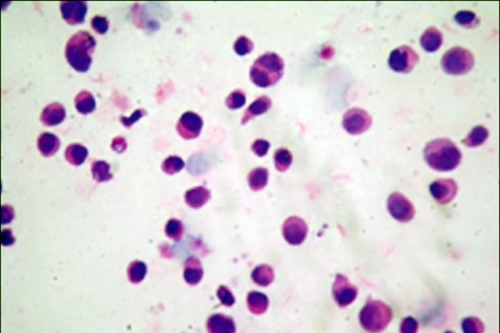19 February 2016. The biotechnology company bluebird bio began testing its experimental gene therapy for multiple myeloma in an early-stage clinical trial. The Cambridge, Massachusetts company — which spells its name in all lower-case letters — is also licensing the technology tested in the trial to the pharmaceutical company Celgene.
Multiple myeloma is a cancer of plasma cells, white blood cells helping fight infections by making antibodies that recognize invading germs. The disorder causes cancerous cells to accumulate in the bone marrow, crowding out healthy plasma cells. Instead of antibodies, the malfunctioning cancer cells produce abnormal proteins that cause kidney problems and other disorders. American Cancer Society expects more than 30,000 new cases of multiple myeloma to occur in the U.S. this year, causing almost 12,700 deaths.
bluebird bio develops treatments for severe genetic and rare diseases with a technology based in part on the work of co-founder Philippe Leboulch, a researcher and lecturer at Paris University School of Medicine, Harvard Medical School, MIT, and Brigham and Women’s Hospital in Boston. Leboulch serves as a scientific advisor to bluebird bio.
The company’s cancer technology takes a patient’s own hematopoietic (bone marrow) stem cells and cultures them outside the body using healthy genes delivered with benign viruses called lentiviruses. The culturing process creates replacement genes for the mutated stem cells causing the disease.
The replacement genes modify the chimeric antigen receptors or CARs on the individual’s T-cells, key white blood cells in the immune system. These CAR T-cells then bind to targeted proteins on the surface of cancer cells and destroy them. In this case, the CAR T-cells aim for B cell maturation antigens, considered a promising target for multiple myeloma.
The clinical trial, conducted at National Cancer Institute, part of National Institutes of Health in Bethesda, Maryland, tests bluebird bio’s immuno-gene therapy candidate code-named bb2121, its first cancer treatment to reach clinical trials. The study is recruiting 50 individuals with multiple myeloma that either relapsed or does not respond to conventional treatments. The trial will first assess the maximum tolerated dose of bb2121, then evaluate the safety, tolerability, and clinical activity of the therapy.
The pharmaceutical company Celgene is partnering with bluebird bio and Baylor College of Medicine on developing CAR T-cell therapies, a collaboration that began in March 2013. Celgene decided to exercise an option on licensing bb2121 that brings bluebird an immediate option fee of $10 million. Under the deal, Celgene receives an exclusive license to develop and commercialize bb2121 following the early stage clinical trials. bluebird will be eligible for further development, regulatory, and commercial milestone payments, as well as royalties on product sales.
Read more:
- MD Anderson, AbbVie Partner on Immunotherapies
- Biotechs to Develop Antibody Therapies, Explore Merger
- High Blood Cancer Response Rates Found for Cell Therapies
- FDA Approves Antibody Treatment for Lung Cancer
- Cancer Institute Spins-Off Company, Gains Licensing Deal
* * *


 RSS - Posts
RSS - Posts
You must be logged in to post a comment.